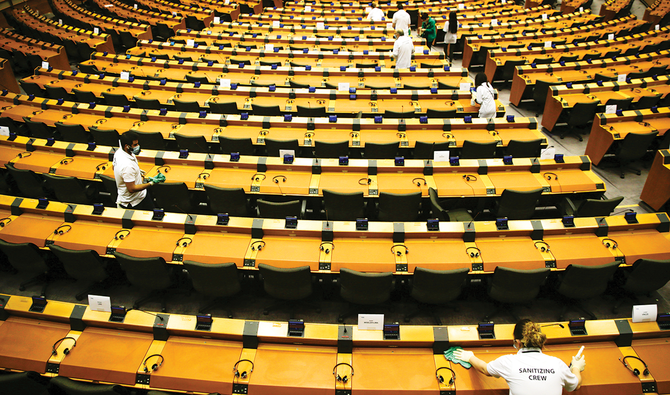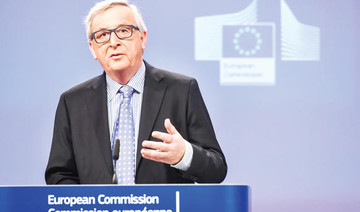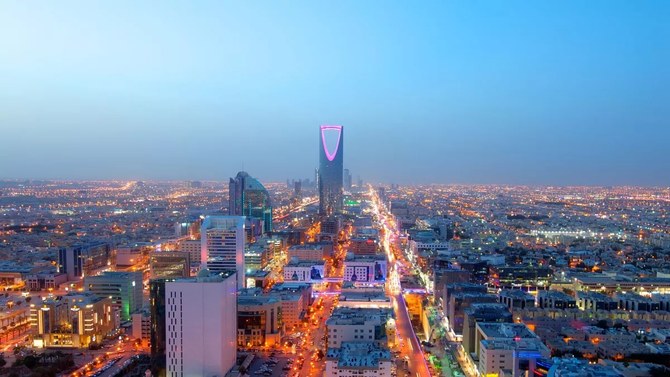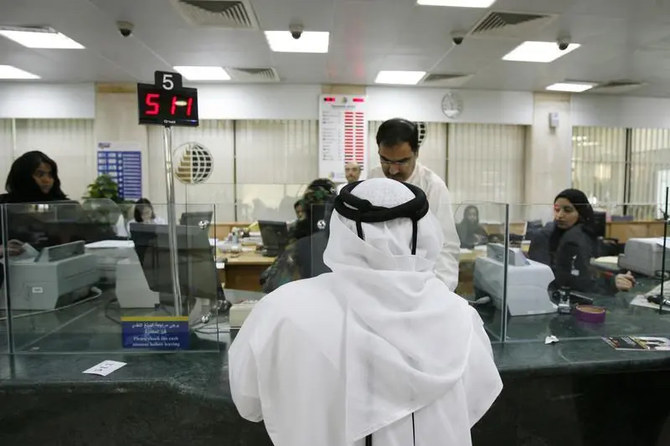LONDON: Europe’s economy was just catching its breath from what had been the sharpest recession in modern history. A resurgence in coronavirus cases this month is a bitter blow that will likely turn what was meant to be a period of healing for the economy into a lean winter of job losses and bankruptcies.
Bars, restaurants, airlines and myriad other businesses are getting hit with new restrictions as politicians desperately try to contain an increase in infection cases that is rapidly filling up hospitals.
The height of the pandemic last spring had caused the economy of the 19 countries that use the euro to plunge by a massive 11.8 percent in the April-June quarter from the previous three-month period. About 1.5 million more people registered as unemployed during the pandemic. The damage was contained only by governments’ quick decision to spend hundreds of billions of euros to keep another 45 million on payrolls and companies running.
While the new restrictions are so far not as drastic as the near-total shutdown of public life imposed in the spring, they are kicking an economy that’s down. For many Europeans, there is a foreboding sense of déjà vu.
“It is a disaster,” says Thomas Metzmacher, who owns a restaurant in Germany’s financial hub, Frankfurt, of the government’s decision to impose an 11 p.m. curfew.
He noted that even before the new restrictions many people in his industry could only just about survive. The curfew means people who come in for a meal don’t linger for a few extra beers or schnapps, which is where restaurants make most of their profits. “Now it is: Go for a meal, finish your drink, pay, go home,” he said.
Experts say that the global economy’s course depends on the health crisis: Only when the pandemic is brought under control will it recover.
Countries like China, which have so far avoided a big resurgence like Europe, are faring better economically. The US never quite got its first wave under control and its economy remains hobbled by it.
Europe had reduced the number of infections much faster than the US and managed to keep a lid on unemployment. But the narrative that contrasted Europe’s successes against the Trump administration’s failure to subdue the pandemic is being quickly revised.
As coronavirus cases rise anew in Europe, economists are slashing their forecasts.
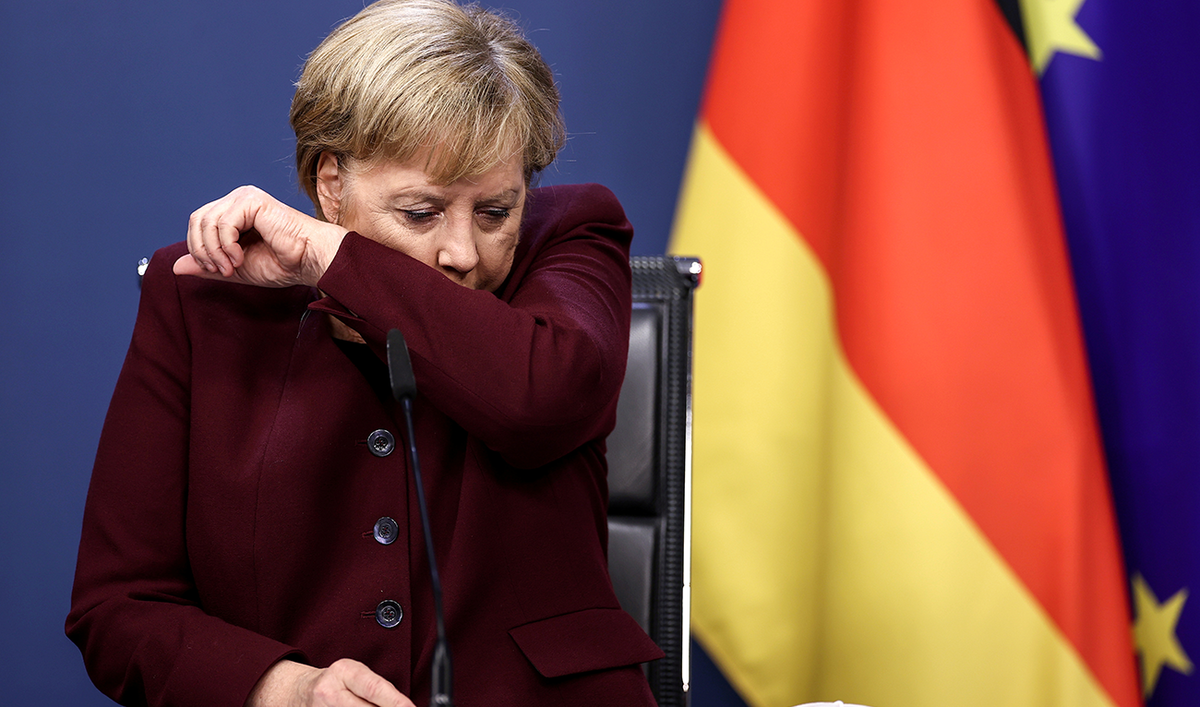
German Chancellor Angela Merkel has extended the wage support plan as tighter business restrictions return. (Reuters)
Ludovic Subran, the chief economist at financial services firm Allianz, says there is a high risk that the economies of France, Spain, and the Netherlands will contract again in the last three months of the year. Italy and Portugal are also at risk. While Germany is seeing an increase in infections, too, it is not as bad and the economy appears more resilient.
“We see an elevated risk of a double dip recession in countries that are once again resorting to targeted and regional lockdowns,” he said.
The pandemic is worsening just as governments were trying to ease off the massive amounts of financial support they have been giving households and business owners.
Many governments have programs where they pay the majority of salaries of workers who are redundant in the hope that they will be able to quickly get back to work after the pandemic. In France and Britain that covered a third of the labor force at one point, and 20 percent in Germany. They also gave cash handouts to households and grants to business owners.
Now governments are phasing out some of that support and aiming to provide more targeted aid to people directly affected by new restrictions. That will not help people whose jobs are affected indirectly. A pub facing a curfew, say, would be eligible to get wage support for its staff but the brewery supplying it might not.
The impact will vary between countries — while Britain is shifting to a less-comprehensive wage support plan, Germany has extended its program.
As with the pandemic’s initial surge in the spring, the sectors in Europe most affected by limits on public life are services including travel and hospitality — those that depend most on face-to-face contact between people.
Countries like Spain, Portugal and Greece rely heavily on tourism. It accounts for almost 12 percent of Spain’s economy, compared with less than 3 percent for the US and about 7 percent for France.
Major airlines in Europe expect to operate at about 40 percent of normal levels this winter and are again cutting the number of flights. Lufthansa, British Airways and others are cutting tens of thousands of jobs as they expect no quick return to how things were before the pandemic — even with government aid.
Even where there are no hard restrictions, the health hazard scares customers away, so shops are likely to see less business.
The EU is giving €750 billion ($880 billion) in financial support to member countries to cope with the fallout. Governments like Spain’s were planning to invest in long-term projects such as renewable energy and technology. It now appears they will have to spend more on just keeping the economy afloat. The European Central Bank is injecting €1.35 trillion ($1.6 trillion) into the economy, which keeps borrowing cheap even for countries with weak finances like Spain and Italy.
But the longer the pandemic drags on, the more the decisions on how to spend financial aid will become political, says Subran, the economist. Political parties are fighting over how to deploy the resources, and unions are going on strike to influence the debate. It mirrors the turmoil in the US, where a badly needed stimulus package has been delayed.
For Ludovic Nicolas-Etienne, a Parisian shopping for food among the stalls of the central Bastille square, it is a tragedy foretold. He blames the people who during the summer disregarded safety recommendations to party and socialize after months of lockdown.
“I was expecting this,” he said, wearing a mask outdoors the day after France announced a state of emergency. “Some people are not responsible enough, so the good people are paying for the bad ones.”



